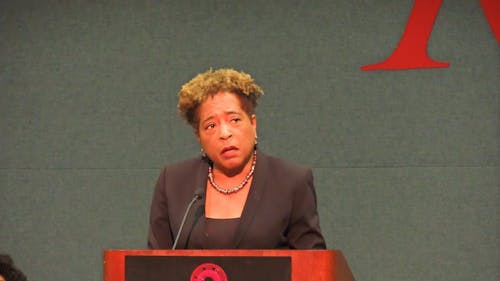In new book, Rutgers details role of slavery in building Old Queens

At least one enslaved person laid the bricks and mortar that make up Old Queens on the College Avenue campus, and several of Rutgers' benefactors and trustees in the late 1700s and early 1800s were slaveowners.
The Committee on Enslaved and Disenfranchised Populations, first announced by Rutgers-New Brunswick Chancellor Richard L. Edwards last November, reported the results of their research Friday afternoon in the College Avenue Student Center during "Scarlet and Black," a presentation which launched a book by the same name detailing the committee's findings.
"I thought this was a piece of our history that wasn’t well-known at all, so I decided to put together a committee that would look at the role of enslaved and Native American populations in terms of Rutgers history," Edwards told The Daily Targum. "The results will be available in a book to give us a permanent record."
Researchers with the committee, which included faculty members and students, looked at records in Alexander Library, the New Brunswick Free Public Library, archives in Trenton and the National Archives in Washington D.C.
The documents used to verify whether a person was a slave-owner or not included various historical records, including files as mundane as wills, said Miya Carey, a Ph.D. candidate with the Department of History. The committee looked at wills which many slave-holders used to bequeath slaves to their descendants.
Financial records also played a role. Will - the slave rented to Queen's College during the construction of Old Queens - was only discovered because the doctor who owned him recorded that information, said Jesse Baykor, a Ph.D. candidate.
The committee believes other slaves were involved in building Old Queens because the contractors involved were verified slave-holders, but have not discovered any documentation confirming this, he said.
Kendra Boyd, a Ph.D. candidate at Rutgers, said the practice of slavery was prominent during Queen's College's early years, at least in part because it was seen as being both socially and religiously acceptable at the time.
"The Dutch Reformed Church did not see the enslavement of Africans as an evil," Boyd said. "Monetary donations from wealthy slave-holding families saved the institution ... A donation by Colonel Henry Rutgers also helped ... (he) had longstanding relations to slavery."
Slave-holders held prominent positions on the Rutgers Board of Trustees in its early years, and Jacob Hardenbergh, the school's first president, also came from a slave-holding family, Boyd said.
Hardenbergh's parents owned Sojourner Truth's parents, and his brother, Charles Hardenbergh, had ownership of the abolitionist herself for several years, Carey said. Truth's parents were set free by other members of the Hardenbergh family after Charles Hardenbergh died.
Both of Truth's parents died a short time later.
The committee recommended recognizing slavery in Rutgers history by placing plaques on buildings named after slave-holders, a digital tour of historical sites that involved enslaved groups, a digital archive of the research that went into "Scarlet and Black," as well as continued research into the history of Rutgers with regard to disenfranchised populations.
Other recommendations include funding graduate students and a postdoctoral researcher to continue the research, said committee Chair Deborah Gray White, a professor in the Department of History.
She also recommended adding a course on diversity to the School of Arts and Sciences core curriculum.
The Chancellor's office is reviewing the recommendations and it it is likely that they can all be accomplished in short order, Edwards said.
"What I hoped was to get an accurate portrayal of that segment of Rutgers history which many people were not aware of," Edwards said. "I think my original goal has been accomplished in that we now know a great deal about the role of slavery in the history of Rutgers, but I think there’s more to it and we have to research more."
Nikhilesh De is the news editor of The Daily Targum. He is a School of Engineering senior. Follow him on Twitter @nikhileshde for more.



